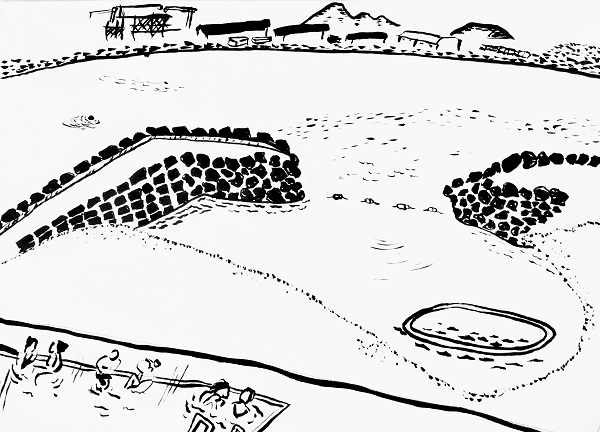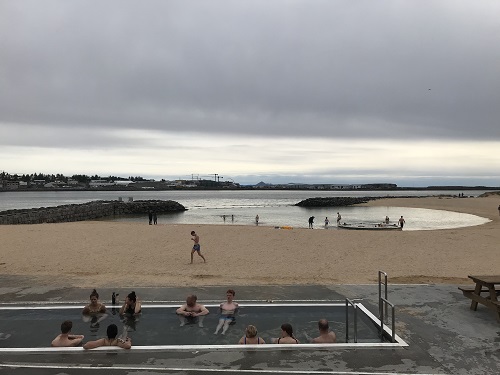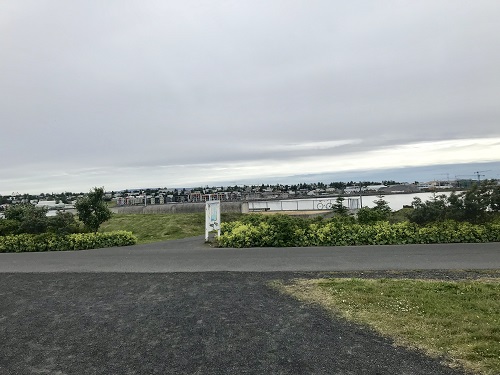
Public goods are really nice
Iceland is a place of unique beauty, a people with a unique sense of self and occasional 24-hour daylight. You probably know all of that. Did you know, however, that it is also a land of really outstanding public bathing facilities?
Seriously, this is true. Basically every town has a public pool, but these pools aren't just pools. They also come with hot pots of various temperatures (we call them hot tubs in America), steam rooms, fountains and well behaved users. They have plastic boats and tea pots for children to play with. Sometimes they have water slides! They stay open late and visiting them costs a reasonable amount of money.
 |
|---|
| The rectangular pool at the front is the always warm hot pot. The circular thing that can be seen outside the edge of the water is the hot pot that overflows into the lagoon. At high tide, it actually ends up all the way under water. Photo by Brady Dale. |
Maybe the most remarkable of these pools is called the Nauthólsvík Geothermal Beach. It is open year round and free to visit in the summer. It has a little swimming lagoon that's heated (sort of) by an overflowing hot pot at the edge of the beach. Year round, kids and adults can frolic in the the water! And then up at the top of the beach there's a warmer hot pot for the less adventurous to hang out in, look out at the sea and what someone there said was a once active volcano (the Krysuvik, perhaps?).
Nauthólsvík is so unassuming from the outside that I actually walked right by it when I got there and wandered on to this little bistro located nearby, thinking it was the admission house. Just in case you go down there, here's a photo of the entrance:

I just got back from Iceland, if that wasn't obvious. It was my second time visiting. And being there made me think a lot about how nice it is to have a general public spirit and an idea that it's good to have public institutions designed to benefit everyone.
The pools with their warm water and hot pots is one of the most obvious examples, and of course all this heat is especially easy for Iceland with its plentiful geothermal energy, but that's not all it had in terms of investments in shared public life.
As I visited museums, it became clear that patronage of artists has been an important part of Icelandic history. Ásmundur Sveinsson basically never had to sell his work because the city supported him. We visited parks large and small that were all over the place. In fact, it seemed like many of the parks were probably owned by individuals or non-profit organizations and simply kept open in a spirit of public-mindedness.
The buses were lovely and clean and regular and they traveled well outside the city (I wish I had used that feature). In fact, they have a pretty well-designed mobile app. And there's WiFi on the buses. In fact, most of the public spaces had free WiFi (though like a lot of WiFi in Iceland, it somehow doesn't work that well).
There's public art work all over the place, especially sculpture, but also lots of really strikingly strong murals.
It's a small thing, but it also seemed like all the museums offered their visitors free coffee. In a place where a cup of drip coffee costs about $4.00, that's a pretty nice little perk for visiting.
When I visited Britain, years and years ago, at first I didn't think it was that different than the United States. Then I got out into the countryside. There's public byways for hikers all over the farmland out there. A person can just walk through a farmer's field, and no one raises an eye. The paths are clearly marked, with special entrances designed so humans can get in but animals can't get out.
I don't think there's a place on this whole continent tha works like that.
It's too bad.
A lot of this openness seems to rest on a level of one person being able to trust the other, in general, which isn't a spirit we have much of here in the States. Perhaps the openness engenders trust, though? That's probably wishful thinking. It's probably more an artifact of homogeneity.
It's easier to trust people who have the same general expectations as you. I will grant this point.
All that said, it's hard to argue against this (though I know many ridiculous people do): nicely maintained public goods are really nice. Here in the States, we tend to think of public goods as "places for poor people." Norms aren't established for their use by a broad swath of society and they get run down because society is only barely willing to invest in them.
That's too bad. Public spaces used by everyone and maintained well do an exceptionally good job of making things nicer for everybody in a way that private and pricey spaces just never can.
Said another way, it takes a culture with a particularly civic outlook to say to itself: you know what we should make? A beach where people can swim all year long.
—Brady Dale
July 4, 2019